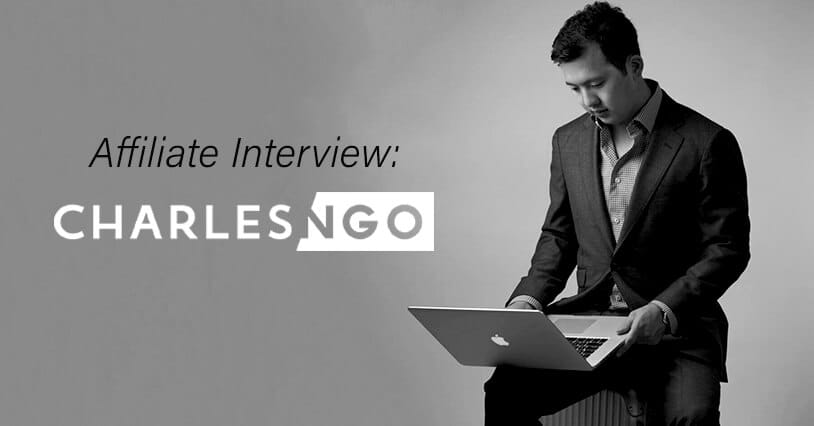Contenido

En el blog de hoy, tenemos a un personaje muy interesante y conocido en el espacio del marketing de afiliación.
Puede que lo haya visto en conferencias o en Internet. A menudo se le describe como un James Bond asiático.
De todos modos, creo que todos estamos de acuerdo en que es un tipo hábil, y sin duda sabe lo que hace cuando se trata de marketing de afiliación.
He estado siguiendo Charles Ngo desde hace unos años, y siempre estoy sorprendido por todo el material de alto valor que regala a sus lectores en su blog. En serio, si aún no lo has hecho, ve y hazte con su guía gratuita sobre marketing de afiliación. de su página web. Te abrirá los ojos.
En cuanto al motivo por el que le quería en el blog, es porque yo hablo mucho de blogs, contenidos y creación de sitios web, mientras que él se centra más en campañas de adquisición de pago y de coste por acción. Cada cual con su estilo. Por eso creo que esta entrevista te va a interesar mucho.
Entremos en la entrevista, ¡porque fue muy buena!
1. Hola Charles, muchas gracias por venir a la entrevista. Soy un gran fan tuyo y te sigo desde hace bastantes años.
Creo que una de las grandes diferencias entre tú y yo es que tú eres un afiliado al estilo CPA (Coste Por Acción), mientras que yo me concentro más en el marketing de afiliación al estilo CPS (Coste Por Venta).
Para la gente que quizá no sepa mucho de CPA, ¿puede explicar la diferencia y qué le hace decantarse por el modelo CPA frente al CPS?
Claro, gracias por recibirme.
Coste por venta: Usted promociona un producto. El cliente tiene que COMPRAR el producto y el afiliado recibe una comisión.
Coste por acción: Usted promociona una oferta. El cliente tiene que tomar una ACCIÓN, entonces el afiliado recibe una comisión.
El coste por venta suele ser más difícil de convertir porque hay que convencer a la persona para que saque su tarjeta de crédito y compre algo.
El coste por acción es más fácil de convertir. La "acción" puede ser rellenar un formulario con el nombre, la dirección de correo electrónico y el número de teléfono de la persona, y luego te pagan. El anunciante gana dinero porque hace un seguimiento con la información de la persona e intenta venderle más adelante.
Piensa en lo fácil que es para alguien realizar una acción en comparación con alguien que saca su tarjeta de crédito y compra algo.
Lo bueno es que no hay tanta diferencia si eres un vendedor afiliado. Algunas ofertas ofrecen ambas formas de monetizar.
Usted puede promover una oferta de citas de la manera CPA, donde alguien llena su información. O puede promover esa misma oferta de citas a través de CPS, donde se le paga más si se registran y compran.
Sugiero a la gente que empiece con el estilo CPA porque es más fácil de convertir y obtener más datos.
2. Para un afiliado novato - alguien que entra en el marketing de afiliación sin experiencia después de aprender lo que es - ¿cuál sería la cosa número #1 en la que crees que debería centrarse primero si quisiera ser un afiliado CPA?
Lo más importante es decidirse por un camino a seguir. Hay gente que pierde meses yendo de un lado a otro.
Un mes se dedican al comercio electrónico. Otro mes es de móviles. Otro mes es de Facebook.
Tienen el síndrome del objeto brillante.
Elige un camino y dedícate a él durante un mínimo de tres meses.
Por ejemplo, digamos que decides que quieres convertirte en un afiliado móvil. Dedica los próximos tres meses a estudiar todo lo que puedas sobre móviles y a aprender todas las campañas para móviles que puedas.
No se puede estudiar todo en el marketing de afiliación, pero se puede dominar una subsección del mismo.
3. Una de las cosas que siempre digo a la gente que quiere alcanzar el éxito en el marketing de afiliación y en los negocios, en general, es que actúen a lo grande.
Sé que usted también es un gran partidario de esto. Hasta qué punto es importante tener un plan de juego y cómo te organizas para llegar a ese nivel?
La gente o planifica demasiado y no actúa, o no planifica y actúa demasiado.
Lo más difícil para la gente es encontrar ese equilibrio entre planificar y pasar a la acción.
Siempre tengo un plan para todo lo que hago. La clave es que, una vez que lo tengo, paso al modo de ejecución. No cometas el error de establecer un plan y luego cambiarlo una y otra vez.
Para organizarme, utilizo un sistema llamado AgileResults. Es un sistema sencillo que utiliza la regla de tres.
Cada año tengo tres resultados que quiero conseguir. Eso se traduce en tres resultados para el mes, para la semana y para el día. Es un sistema de cascada.
Al limitar mis objetivos a tres, me mantengo organizada y centrada.
4. Si tuvieras que empezar de nuevo mañana, ¿qué sería lo primero que harías para reconstruir tu imperio de marketing de afiliación?
Parto de la base de que empiezo con cero dólares y cero conocimientos de marketing de afiliación.
Lo primero que haría sería aumentar mi flujo de efectivo. Esto podría significar conseguir un trabajo. He visto demasiada gente que quiere saber cómo puede ganar dinero en Internet con un presupuesto de $200. Es difícil. Apenas puedes pagar las herramientas con ese presupuesto.
Cuanto más dinero pueda invertir en su negocio, mayores serán sus posibilidades de éxito.
En segundo lugar, haría todo lo posible por encontrar un mentor.
Recuerda esto: nadie te debe nada. Qué valor puedes aportar a alguien para que te ayude?
A continuación, haría ingeniería inversa de lo que funciona. Invertiría en una herramienta espía y me fijaría en las campañas más importantes. ¿Qué tienen en común? ¿Qué tipo de ofertas utilizan? ¿Qué tipo de páginas de destino?
Imitar, luego innovar.
5. Has viajado mucho y has visitado y vivido en algunos lugares interesantes de todo el mundo, desde América hasta Asia. Ahora te has instalado en Nueva York y llevas allí un tiempo. ¿Qué le hizo elegir Nueva York?
El lugar que elijas para vivir influye enormemente en tu felicidad y calidad de vida.
Afortunadamente, tengo una carrera que me permite vivir donde quiera, y lo he aprovechado. Sigo mudándome cada año porque siempre he sentido curiosidad.
En cuanto a Nueva York, me mudé aquí por varias razones. La principal es que tengo 33 años y no estoy casada. Sentí que se me estaba cerrando la ventana para poder vivir en NYC antes de sentar la cabeza.
Siempre he querido vivir en Nueva York, desde que era niño. Es caro vivir aquí, pero siempre puedo ganar más dinero.
No puedo poner precio a las experiencias y al crecimiento que he podido tener viviendo aquí.
6. Qué le espera a Charles Ngo en lo que queda de 2018?
Tenemos previsto lanzar nuestros primeros cursos en línea este mismo año.
Durante los últimos años he estado enseñando a la gente a través de talleres presenciales. Tomamos la decisión de cambiar a cursos en línea, principalmente porque el modelo de taller es agotador.
Fuera de eso, ¡sólo me centro en aprender y crecer!
7. ¿Dónde puede encontrarte la gente y seguir lo que haces?
Ya no estoy activa en las redes sociales. El mejor lugar para encontrarme es mi blog, www.CharlesNgo.com.


